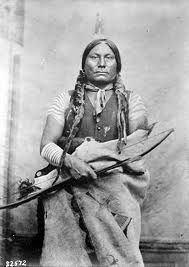Chief Gall (Pizi)
Chief Gall (Pizi)
GALL was Chief of the Sioux Tetons Hunkpapas
(1840-1894) Warrant of Sitting Bull, he fought at the head of Hunkpapas warrior in the battle of Little Big Horn River
25 June 1876 and contributed to the victory of the Indians.
The Chief Gall was one of the most aggressive leaders of the Sioux Nation. He was one of the relatives of Sitting Bull, its main support. He vigorously defended the rights of his people on the plains buffalo, and thought he could enforce the agreements with the government.
Gall was born in South Dakota near the Moreau River.
He took part in the war led by Red Cloud from 1865 to 1868.
After a period of peace, when the Treaty was violated in 1868, he joined Sitting Bull to defend their territories, he participated in that capacity at the Battle of Little Bighorn (June 25, 1876) where General Custer and his men were wiped out and s 'fled with him to Canada. They thought they were heard by the Canadian government, and were very disappointed to have to go back on American soil.
Finally, Gall decided in 1881 to stop the war against the whites, he presented himself at Fort Peck, Montana, followed by half of the Hunkpapa band, where he was soon joined by Sitting Bull. Although Gall had received assurances that there would be no reprisals on his people, he learned quickly that many Indians are attacked.
In the spring, the chief Gall and his people were considered prisoners of war, and transferred to Standing Rock Agency, where he became in 1889 judge of the 'court of Indian Offences' and where he died
Chef Gall (Pizi)
GALL était Chef des Sioux Hunkpapas Tetons
(1840-1894)Adjudant de Sitting Bull,il se battit à la tête des guerrier Hunkpapas dans la bataille de la Little Big Horn River
le 25 juin 1876 et contribua à la victoire des Indiens.
Le chef Gall est l'un des leaders les plus agressifs de la Nation Sioux. Il fut l'un des proches de Sitting Bull, son principal soutien. Il défendait vigoureusement les droits de son peuple sur les plaines des buffles, et croyait pouvoir faire respecter les accords passés avec le gouvernement.
Gall est né dans le Dakota du Sud près de Moreau River.
Il prit part à la guerre dirigée par Red Cloud de 1865 à 1868.
Après une période de paix, quand le Traité de 1868 fut bafoué, il rejoignit Sitting Bull pour défendre leurs territoires, il participe à ce titre à la bataille de Little Bighorn (25 juin 1876) où le général Custer et ses hommes furent anéantis et s'enfuit avec lui au Canada. Ils pensaient être entendus par le gouvernement canadien, et furent très déçus de devoir rentrer sur le territoire américain.
Finalement, Gall décide en 1881, de cesser la guerre contre les blancs, il se présenta à Fort Peck, au Montana, suivi par la moitié du groupe Hunkpapa, où il fut bientôt rejoint par Sitting Bull. Malgré le fait que Gall avait reçu l'assurance qu'il n'y aurait pas de représailles sur son peuple, il sut rapidement que beaucoup d'Indiens seraient attaqués.
Dès le printemps, le chef Gall et son peuple furent considérés comme prisonniers de guerre, et transférés à l'agence de Standing Rock où il devint à partir de 1889 juge à la 'court of Indian Offences' et où il mourut
Inscrivez-vous au site
Soyez prévenu par email des prochaines mises à jour
Rejoignez les 76 autres membres

